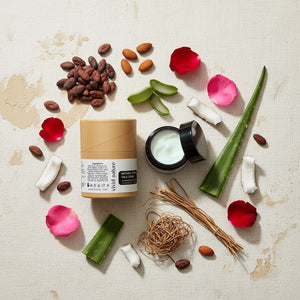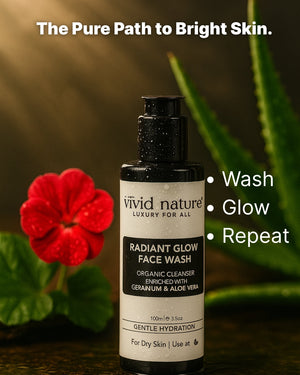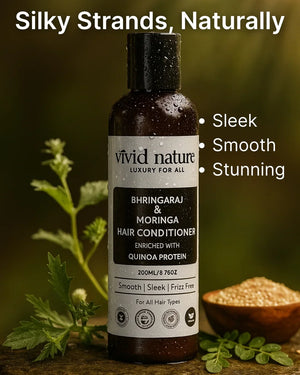Best Tips for Healthy Hair: Embrace the Power of Nature and Ayurveda

Having healthy, vibrant hair is a sign of overall wellness and a goal many strive to achieve. With the plethora of products and advice available, it can be overwhelming to determine the best approach for maintaining healthy hair. In this blog, we’ll explore the best tips for healthy hair, incorporating the wisdom of Ayurveda, DIY recipes, and highlighting the benefits of using natural products like Vivid Nature's Ayurvedic Hair Mask, especially during the monsoons.
Understanding Hair Health
Healthy hair is characterized by its shine, strength, elasticity, and smooth texture. Factors influencing hair health include genetics, diet, lifestyle, and hair care practices. Common hair issues such as dryness, frizz, hair loss, dandruff, and split ends can all be managed with the right approach.
Ayurvedic Principles for Hair Care
Ayurveda, the ancient Indian system of medicine, offers a holistic approach to hair care. According to Ayurveda, hair health is linked to the balance of the doshas (Vata, Pitta, and Kapha) and overall health. Here are some Ayurvedic tips for maintaining healthy hair:
Balance Your Doshas
- Vata Dosha: Imbalance can cause dry, frizzy hair and split ends. Use nourishing oils and hydrating masks.
- Pitta Dosha: Imbalance can lead to hair thinning and greying. Use cooling and soothing ingredients.
- Kapha Dosha: Imbalance can result in oily scalp and dandruff. Use cleansing and balancing ingredients.
Nourishing Your Hair from Within
- Diet: Eat a balanced diet rich in vitamins, minerals, and proteins. Include foods like leafy greens, nuts, seeds, and whole grains.
- Hydration: Drink plenty of water to keep your hair hydrated.
- Herbal Supplements: Incorporate Ayurvedic herbs like Amla, Brahmi, and Bhringraj to strengthen hair.
DIY Recipes for Healthy Hair
1. Nourishing Hair Mask for Dry Hair
Ingredients:
- 2 tablespoons Nettle Powder (Urtica Dioica)
- 2 tablespoons Methi Powder (Trigonella Foenum-Graecum)
- 2 tablespoons Amla Powder (Phyllanthus Emblica)
- 1 tablespoon Coconut Oil (Cocos Nucifera)
- 5 drops Rosemary Essential Oil (Rosmarinus Officinalis)
Instructions:
- Mix all the powders in a bowl.
- Add coconut oil and rosemary essential oil to form a paste.
- Apply the mask to your scalp and hair.
- Leave it on for 30 minutes.
- Rinse with lukewarm water and shampoo.
Benefits: This mask deeply nourishes and hydrates dry hair, promoting hair growth and reducing hair fall.
2. Anti-Frizz Hair Mask for Curly Hair
Ingredients:
- 2 tablespoons Hibiscus Powder (Hibiscus Sabdariffa)
- 2 tablespoons Reetha Powder (Sapindus Mukorossi)
- 1 tablespoon Methi Powder (Trigonella Foenum-Graecum)
- 1 tablespoon Coconut Oil (Cocos Nucifera)
- 5 drops Tea Tree Essential Oil (Melaleuca Alternifolia)
Instructions:
- Mix the powders in a bowl.
- Add coconut oil and tea tree essential oil to form a smooth paste.
- Apply to damp hair and scalp.
- Leave it on for 30-45 minutes.
- Rinse with lukewarm water and follow with a conditioner.
Benefits: This mask controls frizz, enhances curl definition, and promotes a healthy scalp.
3. Strengthening Hair Mask for Hair Growth
Ingredients:
- 2 tablespoons Shikakai Powder (Acacia Concinna)
- 2 tablespoons Amla Powder (Phyllanthus Emblica)
- 1 tablespoon Ginger Powder (Zingiber Officinale)
- 1 tablespoon Coconut Oil (Cocos Nucifera)
- 5 drops Cedarwood Essential Oil (Cedrus Atlantica)
Instructions:
- Mix the powders in a bowl.
- Add coconut oil and cedarwood essential oil.
- Apply the mask to your scalp and hair.
- Leave it on for 30 minutes.
- Rinse with lukewarm water and shampoo.
Benefits: This mask strengthens hair roots, promotes hair growth, and reduces hair fall.
Best Tips for Healthy Hair
1. Regular Scalp Massages
Scalp massages stimulate blood circulation, promoting hair growth and improving scalp health. Use natural oils like coconut, almond, or sesame oil. Add essential oils like rosemary, tea tree, or lavender for added benefits.
2. Use Natural and Ayurvedic Hair Masks
Hair masks provide deep conditioning and nourishment. Try Vivid Nature's Ayurvedic Hair Mask during the monsoons to combat frizz and dryness. This mask strengthens hair, adds shine, and improves overall hair health.
Visit Vivid Nature's Ayurvedic Hair Mask
3. Gentle Hair Washing Routine
Over-washing can strip natural oils, leading to dryness. Use a mild, sulfate-free shampoo, and wash your hair 2-3 times a week. Avoid hot water as it can damage hair and scalp.
Use a natural conditioner after every wash to lock in moisture. Focus on the ends of your hair to prevent split ends and breakage.
5. Avoid Heat Styling
Minimize the use of heat styling tools like blow dryers, straighteners, and curling irons. If necessary, use a heat protectant spray to reduce damage.
6. Protect Your Hair from Environmental Damage
Wear a hat or scarf to protect your hair from the sun, wind, and pollution. During the monsoons, keep your hair dry to prevent fungal infections and frizz.
7. Regular Trimming
Trim your hair every 6-8 weeks to get rid of split ends and maintain healthy hair growth.
8. Detangle Gently
Use a wide-tooth comb or a brush with soft bristles to detangle your hair. Start from the ends and work your way up to prevent breakage.
Monsoon Hair Care with Vivid Nature’s Ayurvedic Hair Mask
The monsoon season can be challenging for hair care due to high humidity, which can lead to frizz, dandruff, and hair fall. Vivid Nature's Ayurvedic Hair Mask is an excellent choice to maintain healthy hair during the monsoons. Its natural ingredients, including herbal extracts and essential oils, provide deep nourishment, strengthen hair, and keep it manageable despite the humidity.
Explore Vivid Nature’s Ayurvedic Hair Mask
Incorporating Ayurvedic Practices for Healthy Hair
Regular Oil Massages
- Coconut Oil: Deeply nourishes and moisturizes the hair.
- Almond Oil: Rich in vitamins A, B, and E, which promote healthy hair growth.
- Sesame Oil: Strengthens hair roots and prevents premature greying.
Herbal Rinses
- Amla and Shikakai Rinse: Boil Amla and Shikakai in water, let it cool, and use as a final rinse after shampooing for added shine and strength.
- Neem and Tulsi Rinse: Boil Neem and Tulsi leaves in water, cool, and use to combat dandruff and promote scalp health.
Healthy Diet and Lifestyle
- Balanced Diet: Incorporate plenty of fresh fruits, vegetables, lean proteins, and healthy fats.
- Hydration: Drink at least 8-10 glasses of water daily.
- Exercise: Regular physical activity improves blood circulation, benefiting hair health.
- Stress Management: Practice yoga, meditation, or other relaxation techniques to reduce stress, which can affect hair health.
Conclusion
Achieving and maintaining healthy hair requires a combination of proper hair care practices, a balanced diet, and the use of natural, effective products. Embracing Ayurvedic principles can provide holistic benefits, promoting not just hair health but overall wellness. Incorporate the tips and DIY recipes mentioned above into your hair care routine, and consider using Vivid Nature's Ayurvedic Hair Mask, especially during the monsoons, for the best results.
Healthy hair is a journey, not a destination. With consistent care and the right approach, you can enjoy beautiful, strong, and vibrant hair all year round.
Visit Vivid Nature's Ayurvedic Hair Mask and start your journey towards healthier hair today!


 Blog posts of vivid nature
Blog posts of vivid nature



